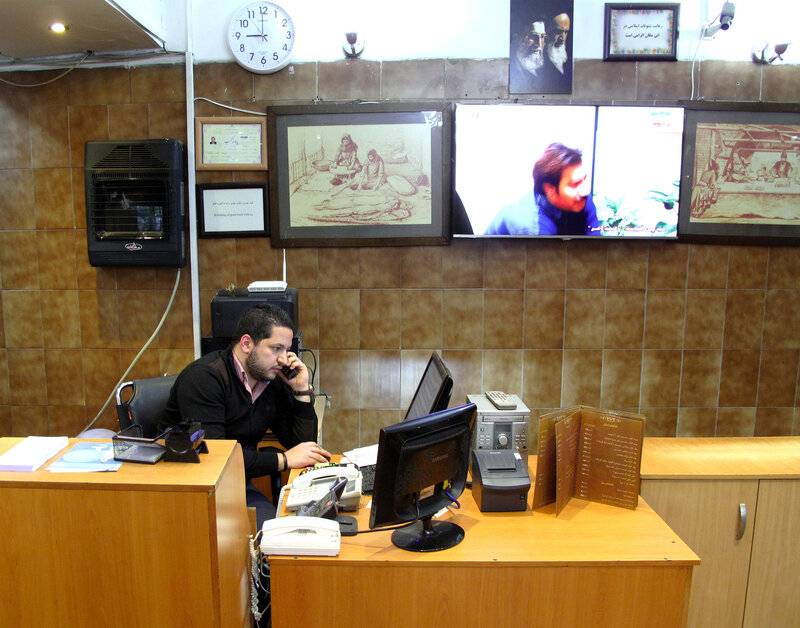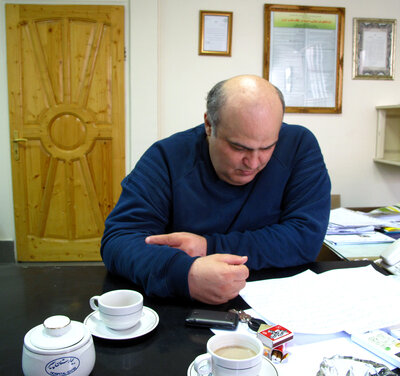Mindful
Diamond Member
- Banned
- #321
Crooks and carpetbaggers who ran with the loot they helped the shahs steal.drivel
More likely scared of putting a foot wrong and what will happen to their families
Iran s Jews It s Our Home And We Plan To Stay Parallels NPR
The Jews' very presence in Iran demonstrates the complexity of a country that is hard for outsiders to understand. Our search to understand what keeps the Jews here begins in the kitchen of a kosher restaurant in Tehran.
The cooks were in the basement, cutting up meat. We took a table in the dining room, and talked with David Shumer, 28, the son of the owner. He says his family has run this place for 35 years, serving kebab and chicken on the bone.
"Many restaurant is better than this restaurant," he says.
I stopped him, wanting to be sure of his English.
"I am honest," he says with a laugh.
We asked Shumer for an honest answer to a more serious question: What is it like to be Jewish in an Islamic republic?
"It's so good and so happy," he says.
He contends that Jews have equal rights. They don't, as we came to learn, but Shumer does lead a comfortable middle-class life.
"I have a car, and a job. Everything I have is here," he says. "Why not?"

David Shumer handles takeout orders at a kosher restaurant in Tehran that his family has run for 35 years. He has a comfortable, middle-class life and says he is happy in Iran. An image of Ayatollah Ruhollah Khomeini and Ayatollah Ali Khamenei, the past and present supreme leaders of Iran, hangs on the wall.
Molly Messick/NPR
A Long History, A Changing Middle East
Americans might start with a slightly different question: Why are thousands of Jews still in Iran?
The government assigns Jews a different status than Muslims, but still celebrates their presence. It holds them up as evidence of Iran's tolerance.
The truth is, Jews have lived here for millennia, and their story says much about a changing Middle East.
We heard part of that story from Iran's one Jewish member of Parliament, Siamak Moreh Sedgh. His seat is one of five that the government reserves for Iran's religious minorities.
"Iran is the country of unbelievable paradoxes," says Moreh Sedgh, who smoked one cigarette after another from a red-and-white pack of Winstons. "You can find that there is the greatest Jewish community in the Middle East in Iran, in the country with the greatest political problem with Israel."
In addition to being a member of Parliament, Moreh Sedgh is a general surgeon; he met us at the Jewish charity hospital he directs. It takes in patients of all faiths.
Tradition says the first Jews moved here in ancient times. They were forced to move eastward from what's now Israel to the kingdom of Babylon, which was later conquered by the rulers of ancient Persia.
A Commitment To Stay
Today, the Jewish lawmaker says simply that Iranian Jews are Iranians. They stay because it's their country. And Moreh Sedgh says he supports his country's foreign policy, even when it comes to the Jewish state.
He says Judaism is not the same as Zionism, the project of building Israel.

Siamak Moreh Sedgh is the only Jewish member of Iran's Parliament. Jews are not allowed to hold high office or be judges in Iran. Moreh Sedgh is also a surgeon who runs the Dr. Sapir Hospital and Charity Center. Most of the staff and patients are Muslims.
Molly Messick/NPR
"There is a great difference between being a Jew and being Zionist," he says.
The lawmaker draws more distinctions when it comes to Iran's controversial former president, Mahmoud Ahmadinejad, who raised questions about the Holocaust.
"I think that the Ahmadinejad case must be viewed from another window," Moreh Sedgh says. "He does not deny [the] Holocaust clearly. He said there is some question about [the] Holocaust, and this idea was not the official statement of the Iranian government. This was only a personal idea of President Ahmadinejad."
So you Toenail and Ahmadinejad are the same, you both deny parts of the Holocaust happened?
Ask the hundreds of thousands of Iranian Jews, Armenian Iranian Christians, and Bahaiis that have fled Iran.
Ah, another subject you know absolutely nothing about. Majority of the non Muslim minorities have left Iran because of oppression and persecution by the Islamist regime.
http://en.m.wikipedia.org/wiki/Persecution_of_Bahá'ís
UN report blasts Iran for persecution of Christians, other religious minorities
He and his clones are not interested in facts. He's only here to bait and provoke. Any reaction, however negative, turns him on.
